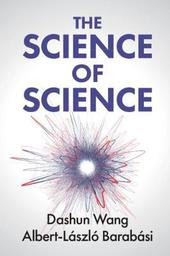
|
The Science of Science
Paperback / softback
Main Details
Description
This is the first comprehensive overview of the 'science of science,' an emerging interdisciplinary field that relies on big data to unveil the reproducible patterns that govern individual scientific careers and the workings of science. It explores the roots of scientific impact, the role of productivity and creativity, when and what kind of collaborations are effective, the impact of failure and success in a scientific career, and what metrics can tell us about the fundamental workings of science. The book relies on data to draw actionable insights, which can be applied by individuals to further their career or decision makers to enhance the role of science in society. With anecdotes and detailed, easy-to-follow explanations of the research, this book is accessible to all scientists and graduate students, policymakers, and administrators with an interest in the wider scientific enterprise.
Author Biography
Dashun Wang is an Associate Professor at Kellogg School of Management and the founding director of the Center for Science of Science and Innovation, Northwestern University, Illinois. He is a recipient of the AFOSR Young Investigator Award and was named Poets and Quants Best 40 Under 40 Business School Professors in 2019. Albert-Laszlo Barabasi is Robert Gray Dodge Professor of Network Science and Distinguished University Professor at Northeastern University, Boston, where he directs the Center for Complex Network Research. He holds appointments in the Departments of Physics and the College of Computer and Information Science, as well as in the Department of Medicine at Harvard Medical School and at Brigham and Women Hospital in the Channing Division of Network Science.
Reviews'Wang and Barabasi book is a manifesto for the science of science domain. Graduate students (as well as their mentors) owe the authors a debt of gratitude for this impressive synthesis of what is a fast-evolving field of research.' Pierre Azoulay, Massachusetts Institute of Technology 'Analyzing quantitative aspects of science with state-of-art tools, Wang and Barabasi have written an insightful and comprehensive book that will become a must-read for all scholars interested in science.' Yu Xie, Princeton University 'In their engaging book, Wang and Barabasi take a fresh look at the science of science. They convincingly argue that in the age of big data and AI applying the scientific method to science itself not only helps understand how science works but may even enhance it. We are compelled to consider the determinants of individual careers and what this means in the age of large-scale scientific collaborations. These and other questions around the meaning of scientific impact, in academia and beyond, make the book highly relevant to scientists, academic administrators and funders alike. By the time the final, forward-looking chapter ends we are hooked on all the correlations and predictions, and so it is only fitting that we are invited to join in, to help shape the field which is likely to be driven by a human-machine collaboration.' Magdalena Skipper, Nature 'Overall, I found this book very stimulating. It made me wonder whether in-depth metrics analyses of 'only' the subjective narratives of authors, such as the references list they select, actually creates a foundation on which to form judgement rather than opinion? Namely, what fraction of these publications analysed for their metrics were actually underpinned by their data? As well as provoking thought, this book offers a feast of references, 424 in all. There are such further enticing reads as reference 396, Life3.0: Being Human in the Age of Artificial Intelligence. To conclude, I recommend this book for your library, and maybe even take it for your summer beach reading.' John R. Helliwell, Journal of Applied Crystallography '... a text that should appeal to practicing scientists curious about the structure of the whole scientific enterprise, academic administrators and policy makers interested in evidence-based decision-making, and researchers interested in contributing further to the "science of science." There is no better, handier, and more readable work to appeal to such audiences ... Highly recommended.' M. Oromaner, Choice Connect
|